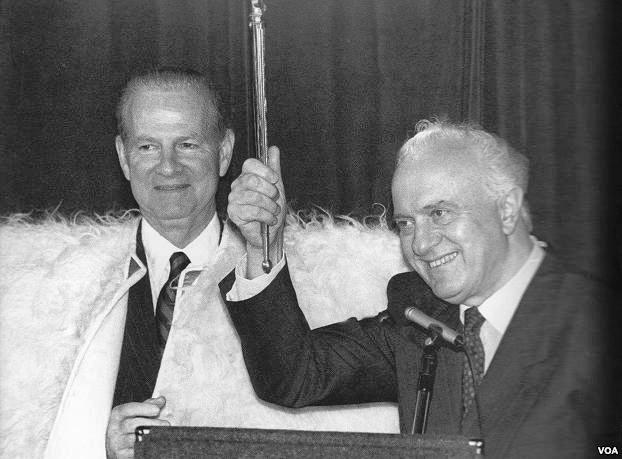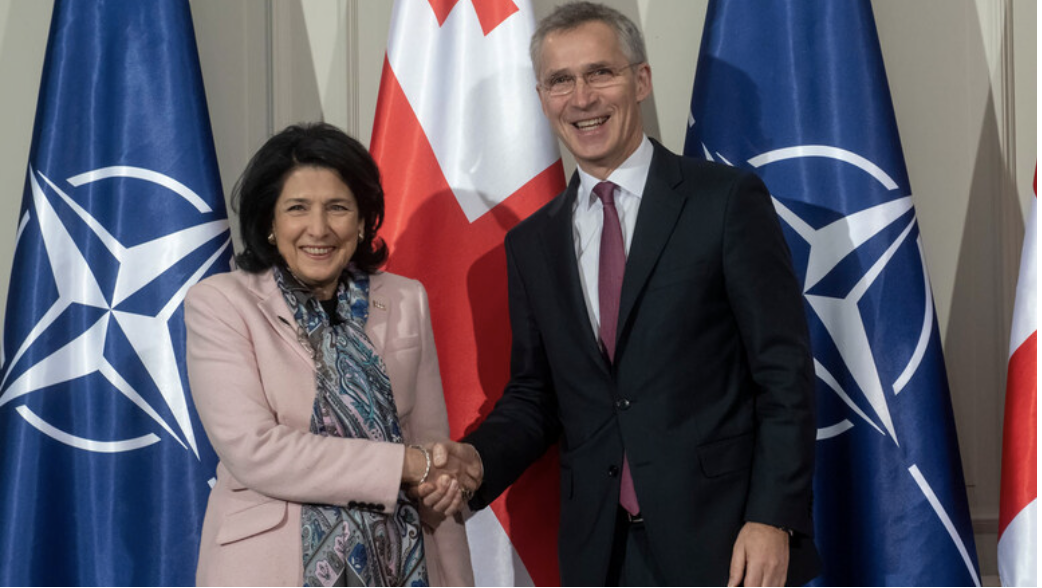Please contact GeorgianStudies@fas.harvard.edu with any questions or concerns, as well as suggestions for the U.S.- Georgia Relations. You can also contact RA Nini Sikharulidze directly at nsikharulidze@college.harvard.edu.
Short History
The United States recognized Georgia’s independence on December 25, 1991, during George H.W. Bush’s presidency.
U.S.-Georgia diplomatic relations were established on March 24, 1992, following communications between Eduard Shevardnadze, the leader of the Georgian State Council, and James Baker, U.S. Secretary of State.
The U.S. statement read: “The President has decided that the United States will take immediate steps to establish diplomatic relations with Georgia. The United States had recognized Georgian independence on December 25, 1991.”

The U.S. Secretary of State James Baker meeting Georgia's Head of State Eduard Shevardnadze in Tbilisi, Georgia, in 1992. This was the U.S. Secretary of State's first ever visit to Georgia. The U.S. Secretary is wearing a nabadi, a traditional Georgian cloak.
The U.S. Embassy in Tbilisi was established on April 23rd, 1992. Carey Cavanaugh was Chargé d’Affaires ad interim (Georgia).
The U.S. supports Georgia’s progress towards reducing corruption and enhancing global security. The U.S. recognizes Georgia’s sovereignty and territorial integrity, and condemns Russia’s 2008 invasion and occupation of the internationally recognized Georgian regions of Abkhazia and South Ossetia, which remain occupied to this day.
The U.S.-Georgia Charter on Strategic Partnership, signed on January 29th, 2009, states its core principles and values to be: strengthening democracy; defense and security cooperation; economic, trade and energy cooperation; and increasing people-to-people and cultural exchanges. To encourage bilateral trade and economic cooperation, the two countries agreed on the export of Georgian products duty-free to the United States under the Generalized System of Preferences program.
In 2005, the Millennium Challenge Compact (MCC) signed a Georgia Compact, a five-year, $295.3 million agreement with the Government of Georgia to foster economic growth through rehabilitating regional infrastructure and increasing access to jobs and markets. In 2008, MCC and the Government of Georgia signed an additional agreement providing up to $100 million for regional infrastructure and energy rehabilitation activities. Following the closing of the Georgia Compact in 2011, in 2013, MCC and Government of Georgia signed a $140 million Georgia Compact II, aimed to improve the quality of education in science, technology, engineering and math (STEM), and the quality of general education in Georgia.

NATO Secretary General Jens Stoltenberg and the President of Georgia, Salome Zourabichvili (March 2019).
Georgia maintains an embassy in the United States in Washington, D.C., with David Zalkaliani as Ambassador of Georgia in the United States.
Georgia and the United States belong to a number of common multilateral organizations, including the United Nations, Euro-Atlantic Partnership Council, Organization for Security and Cooperation in Europe, International Monetary Fund, World Bank, and World Trade Organization.
Georgia is an observer to the Organization of American States, which is the world’s oldest regional organization. Since 1994, Georgia has been a partner in the North Atlantic Treaty Organization’s (NATO) Partnership for Peace 1994 program that aims to enhance European security by connecting its democratic partners of traditionally neutral countries with former Soviet nations.
The United State Agency for International Development (USAID) began operating in Georgia in 1992. Since then, the American government has provided over $1.8 billion in assistance to Georgia through USAID. The U.S. Government dedicates approximately $40 million annually to wide-reaching programs that support Georgia’s democratic development, especially enhanced following Georgia’s 2012 Parliamentary Elections that represented “the first peaceful, competitive, and constitutional transfer of power in the region.”
More information about U.S.-Georgia relations is available through the Department of State website resources.



